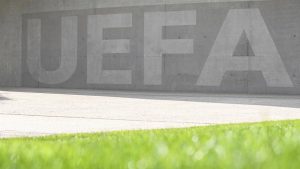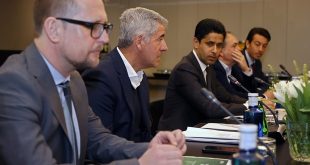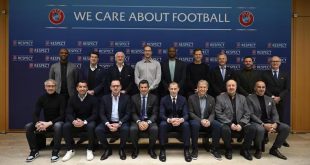 Read the stories of six volunteers who have helped put on huge football events, and hear how the experiences have shaped their personal and professional lives.
Read the stories of six volunteers who have helped put on huge football events, and hear how the experiences have shaped their personal and professional lives.
From organising accreditation for journalists and photographers to helping fans find their way to the stadium, volunteers play frontline roles in delivering football competitions across Europe.
The German Football Federation this week estimated the value of their contribution to amateur football in millions of euros, while the 2019-24 UEFA Strategy dedicates an entire section to volunteers.
Marking Saturday’s annual International Volunteer Day for Economic and Social Development, UEFA put the floodlights on six football volunteers, each with experience of working with UEFA or European national football associations.
In their own words, they reveal the hidden benefits of voluntary work, explaining how their personal experiences helped shape their professional lives.
The perennial volunteer
Name: Peter Nederlof
Age: 48
Residence: Amstelveen, Netherlands
Countries/cities volunteered in: Amsterdam, London, Warsaw, Berlin, Turin, Milan, Baku, Skopje, Madrid, Basel, Kyiv, Lyon, Cardiff, Budapest and Stockholm.
Current job: account manager
Role(s) as a volunteer: So many! Media accreditation, matchday operations, ‘referee’ duty, festival area, photographers’ working area and even ‘trophy runner’.
Lessons learned: Learned a lot about broadcasting and rights holders, time schedules and media / marketing guidelines.
Did volunteering help you to grow personally/professionally? How?
You are always learning. Every country has its own laws, every event / stadium is different. You learn to be flexible but…but you have to also follow the rules.
Why would you recommend volunteering as a way to further career progression?
If you’re interested in working in the world of events, it helps you to really understand what a big event is!
The volunteer-turned-professional
Name: Agata Koziel
Age: 31
Residence: Warsaw, Poland
Countries/cities volunteered in: Warsaw, mainly.
Current job: business analyst, grassroots department (Polish Football Federation)
Role(s) as a volunteer: accreditation (UEFA EURO 2012), grassroots day support, volunteer management.
Lessons learned: communication and networking, skills sharing (“If you give, you will receive”), the power of the group dynamic, knowledge in key areas, professional approach to tasks.
Did volunteering help you to grow personally/professionally? How?
Definitely. Volunteering gave me the opportunity to explore new paths and to figure out how I want to spend my day-to-day life. It provided me the space to explore careers opportunities that were beyond my imagination and knowledge. I developed professional skills, such as communication and teamwork. Volunteering offers incredible networking opportunities! It looks good on resumes and helps make you stand out among other applicants.
I quickly realised that I want to be a part of sports environment and I must pursue this passion. Shortly after the EURO experience, I also took part voluntarily in the UEFA Grassroots Day (during this event I met my current boss!). This resulted in being recruited by the Polish FA – and over the last seven years I’ve worked in the national teams and coaching department, and in the general secretary’s office.
In my case, volunteering was a real life-changer.
Why would you recommend volunteering as a way to further career progression?
Do not think too much, just get involved. Volunteering may provide you with right skills and knowledge so if you’re thinking of pursuing a career, I recommend to document volunteer experiences to help stand out.
With your volunteer effort, could you contribute to economic and social development?
Volunteering adds value. It helps build stronger communities and promotes people to be more active. It results in social capital. It can have positive effects on self-esteem and enhance different skills, expand career paths, and positively influence our health. All of this may contribute to economic and social development.
The volunteer-turned-careerist
Name: Alexandra Nicoleta Apostu
Age: 22
Residence: Bucharest, Romania
Country/city volunteered in: Bucharest
Current job: project manager, assistant to the president of the Romanian Football Federation.
Role(s) as a volunteer in: opening ceremonies at national team matches.
Lessons learned: I consider myself a teamwork oriented person and that’s because of volunteering. You discover yourself, you develop skills that will help your career prospects, you make new friends and all of this happens as you become more responsible.
Did volunteering help you to grow personally/professionally? How?
By volunteering you have the opportunity to experience various fields of activity, having the chance to discover what you are keen on or what does not suit you. You discover skills you didn’t know you had and whatever the outcome, through volunteering, you have a clear picture of who you are and what you want to be, professionally. For me, it was an improvement of my communication skills and I learnt to work in an international environment. I had the opportunity to work with people with experience in a field. I grew, both personally and professionally.
Why would you recommend volunteering as a way to further career progression?
It consists of completing tasks accurately and efficiently, fulfilling rigorous deadlines. Working in teams or individually, you will have to represent that institution. You will learn to be disciplined and could receive recommendations from it. It is not only a way to help others, but also a way to help yourself to be prepared for a future job.
With your volunteer effort, could you contribute to economic and social development?
Volunteers are an important resource in our economy and society, acquiring new skills and adapting to changes in the labour market. To be a volunteer means, first and foremost, to do a good job without promise of material reward. It is sharing your time to help others. This way you can contribute to positive change in society.
The retiree volunteer
Name: Judith Gunion
Age: 73
Residence: Ipswich, England
For more than 35 years I was a journalist, as a reporter and then as a chief subeditor. I left to open my own sports massage practice before retiring just a few years ago.
But the London 2012 Olympics set me on another path, that of an international sporting events volunteer. This put me in an alien working environment which was highly challenging and also one of the most exciting work atmospheres I have ever been in. Being part of that team taught all of us to play to each other’s strengths and how to adapt and improvise to make awkward situations safe and workable.
I was first selected for UEFA Champions League duty for the 2013 final at Wembley 2013. That was the start of my years at the Champions Festival – I always look forward to it.
I grew into the role of volunteer coordinator, assisting management, ensuring young volunteers know what to expect and rotating staff into different jobs. With my background, it was natural to move into the press operations side and I’ve done that since 2015.
Volunteering has been the path for me to break out of my comfort zone, build self-confidence when faced with something totally different or new and thrive in it.
Volunteering has brought me friends from all over the world, helped me learn new languages, made me appreciate the lives of people in the countries I visit and above all it has given me a buzz that makes me look forward to my next adventure.
The volunteer evangelist
Name: Lauri Sibul
Age: 32
Residence: Tallinn, Estonia
Country/city volunteered in: Tallinn
Current job: FC Flora head of game management and marketing
Role(s) as a volunteer: numerous, including film technician, volunteer coordinator (leading team of 42), volunteer manager (running teams for ceremonies, commercial operations and media operations).
Lessons learned: This list is pretty much endless and I think most of the lessons I don’t even notice consciously. Volunteering is a way of trying new things, getting to know new people, making friends, growing as a person and perhaps helping you find your passion. It gives you an opportunity to do something completely different – and you go back to your life refreshed. Volunteering is a way of life for many people and without them, a huge number of projects would not come true.
Did volunteering help you to grow personally/professionally? How?
Yes! You meet great people who are almost always team oriented and want to accomplish great things. They do not have to do the things they do – they want to do them. Thanks to volunteering, I have had the privilege to try many different jobs and that has led me to the things I love to do.
Due to having the privilege of being a coordinator at many projects, I have built up an experience in leading teams of different sizes too.
The last volunteer job I had also helped me get to where I am professionally. Just after the 2018 UEFA Super Cup, I landed a job at the biggest football club in Estonia – FC Flora. I am 100% sure that being a part of the Super Cup helped pave the way for that opportunity.
Why would you recommend volunteering as a way to further career progression?
In my experience, volunteering is the best way to learn more about yourself and find the things you are passionate about. If you don’t know what to do in life, go volunteer in different projects. It is a great way to try out different jobs, but always remember, a volunteering job is not to be taken lightly. There is a great amount of trust placed in you. Do the best you can and you might get noticed!
With your volunteer effort, could you contribute to economic and social development? Volunteering is a way of giving back to society by helping worthwhile projects become a reality – and to be a part of something you enjoy. The more people who do or find what they enjoy through volunteering, the happier the society.
The volunteer turned UEFA employee
Name: Olivier Chovin
Age: 30
Residence: Geneva, Switzerland
Countries/cities volunteered in: Frankfurt/Main, Chicago, Cologne and others
Current job: event workforce coordinator
Role(s) as a volunteer: numerous, including media operations, aid station, hospitality, ‘fan fest’, ticketing and spectator services team leader.
Lessons learned: discovering all the jobs behind the scenes – it made me realise I wanted to be in the football events industry. Also discovering the volunteer culture and meeting some of these ‘super’ volunteers who take part in all the events they can. One told me “Once a volunteer, always a volunteer”, which I personally think is very true – it’s a rewarding experience.
Did volunteering help you to grow personally/professionally? How?
Absolutely. Frankfurt was very exciting for me, being 21 at the time. I met some very good friends and discovered the volunteer culture with the great values it carries.
Professionally, really a turning point, helping me to figure out what kind of careers were possible. Talking to my manager and other professionals also helped to understand how to reach such positions later, realising that I still had a lot to learn first. Later on, when applying for future jobs, I also realised that volunteering was an experience of great added value on a CV.
Why would you recommend volunteering as a way to further career progression?
More and more it becomes appreciated by recruiters, especially in the sports industry. Sports and Volunteering carry a lot of common values: team spirit, kindness, openness, collective efforts, going the extra mile…
It’s maybe still a bit early to talk about it being standard, but I’m convinced that for students looking for a career in the sport, it will become more and more a habit to first collect some first experience as volunteer. It’s a very good way to make good connections and develop some skills.
With your volunteer effort, could you contribute to economic and social development?Definitely contributing directly to the delivery of the events, together with all my volunteer team-mates. Events which in the end are indeed contributing to economic and social development of the hosts.
However, I think that this contribution is even more tangible/perceptible in long-term volunteering missions, for instance through involvements in clubs or associations throughout the year. As a youth coach, for instance, your impact on the social development of the kids is very direct and long-lasting.
Is there a link between your job at UEFA and your volunteer jobs?
Definitely. My volunteer experiences motivated me to start a career in the sports industry, but more so to specialise in the management of volunteer programmes. I finished my masters thesis on volunteer management at major sporting events, then joined UEFA EURO 2016 as a volunteer coordinator, followed by a volunteer manager role at the 2017 Africa Cup of Nations, which eventually helped me to pursue my career at UEFA, where I’m still working on the volunteer project which I like a lot.
 Arunava about Football A look at football & the world through my eyes!
Arunava about Football A look at football & the world through my eyes!



